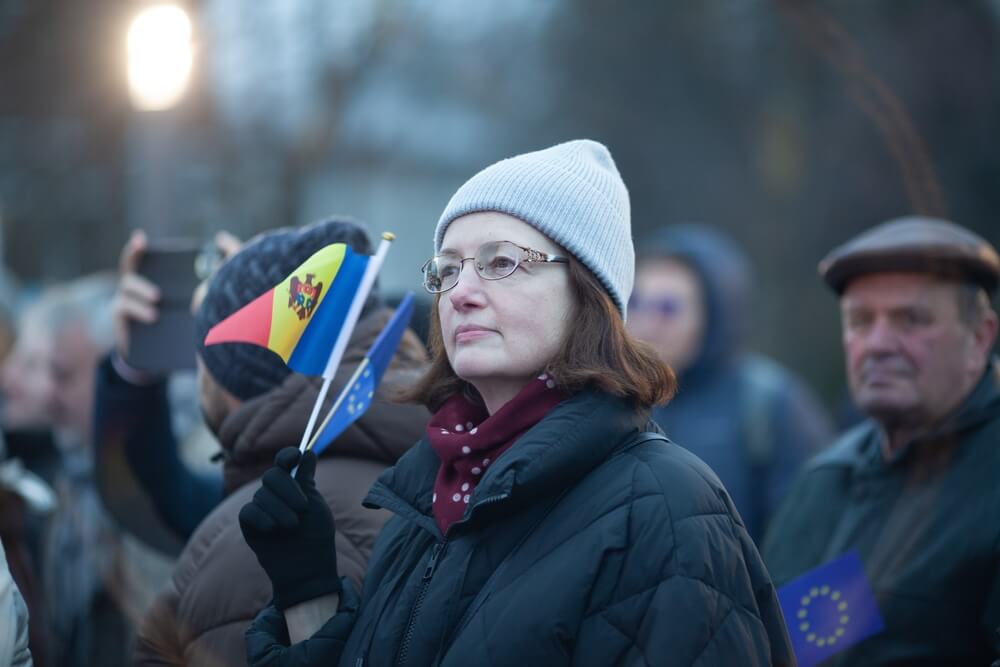Moldova will be under much stronger pressure from Russia next year than before because it has opened a process that should permanently remove it from Moscow's zone of influence.
Maia Sandu, the pro-European president of this small Eastern European country, a former republic of the USSR, announced on the eve of the holidays that she would run for a new mandate in next year's elections.
However, more significant for Moldova is that she invited the parliament to start the procedure for holding a national referendum in which the people would vote on whether or not to join the European Union.
Ever since Russia launched its invasion of Ukraine, Moldova, together with Ukraine, has been on the fast track of the otherwise slow and complex EU accession process.
European leaders are convinced that both countries could have actual protection from Moscow only if they entered the EU as soon as possible. In June 2022, only 3 months after Moldova's application for membership in the 27-member bloc, Brussels granted Moldova candidate country status.
At the recent EU summit, the decision was reached to open accession negotiations with Moldova and Ukraine. The pace of the initial steps has been unprecedentedly faster than in previous waves of EU enlargement, but the following stages will undoubtedly be slower.
Risk of instability
President Sandu seems to want to speed things up even more, so on the eve of Christmas, she called for a referendum on the EU.
“Our future lies in the European family and it is necessary to say clearly, the whole country, which path we choose for Moldova”, Sandu wrote on Facebook.
The referendum should take place in the autumn of 2024 if the parliament approves her initiative. At the same time, probably next November, presidential elections will be held, where Ms Sandu will ask voters to support her for another term.
Though this is uncertain, it raises the prospect that Moldovans will decide whether they want to join the EU and elect a president on the same day in less than a year.
The referendum that President Sandu has been advocating is a somewhat risky move
Regardless of the favourable decisions from Brussels, Moldova is still not entirely determined that it will commit itself to continuing the path towards EU membership.
The referendum that President Sandu has been advocating is a somewhat risky move. Since the process to full membership of the EU will take years, perhaps even a decade, a possible favourable decision in the referendum would oblige all future governments and presidents to continue on the EU path.
However, the referendum failing would be a severe blow to the pro-European government, the president, and particularly to numerous Moldovans who support their policies.
Such a decision would devastate the widespread pro-European mood (for now) in the long term and leave Brussels in a dilemma regarding negotiating membership with a country that does not want that membership.
Alarm on local elections
President Sandu and her government have grounds to believe that the referendum will confirm their pro-EU policy.
The International Republican Institute's (IRI) survey from last September confirmed the widespread support of Moldovans for the EU - almost two-thirds (63%) said they wanted to see the country in the EU.
It is a stable level of support, as measured in November 2022.
 President Sandu and her government have grounds to believe that the referendum will confirm their pro-EU policy
President Sandu and her government have grounds to believe that the referendum will confirm their pro-EU policy
However, the local elections that followed in November gave cause for concern to the ruling pro-European bloc and the president. Her Party of Action and Solidarity received broad support throughout the country but did not seize power in the capital, Chisinau and other major cities.
Moreover, the mayor of the capital, Ion Ceban, who has retained his mandate, is a possible opponent of President Sandu in next year's elections and will rely, as before, on the support of both blocs - pro-European and pro-Russian parties.
November's local elections were a crucial wake-up call for pro-European forces, showing they must do more to participate peacefully in the expected referendum in a year.
However, during that time, Moscow will not sit idly by either, particularly after the announcement of the referendum on the EU, which could mark the point of no return for Moldova.
Despite banning the largest pro-Russian party, Shor, last June and banning its incarnation, Chance Party, just 2 days before the local elections, the pro-Russian electorate showed in the local elections that it was still very influential.
Threats from Moscow
Since the start of its aggression against Ukraine, Russia has kept Moldova under constant tension, focusing on the disputed region of Transnistria along the border with Ukraine, where it still has about 1,500 troops.
The spill over of the conflict from Ukraine to Moldova has been a significant trump card for Moscow all this time, and a crucial part of that strategy is discouraging a country with 2.5 million citizens from moving more decisively towards the EU.
Sergei Lavrov openly reiterated Moscow's intentions to keep Moldova in its orbit
Sergei Lavrov, the head of Russian diplomacy, openly reiterated Moscow's intentions to keep Moldova in its orbit at the recent OSCE Ministerial Council in North Macedonia.
"Moldova is destined to fall the next victim in the West-unleashed hybrid war against Russia”, Lavrov said 3 weeks ago. In Moscow's vocabulary, this means that it treats Moldova in the same way as Ukraine, as a proxy of the West, which Russia opposed using armed aggression.
This is a clear warning that in the next year, Russia will not hesitate to exert more pressure on Moldova than before, including military pressure.
President Sandu's call for a referendum on EU membership is a decisive step. However, until next November, it will be fraught with the risks of an open Russian reaction, which no doubt saw this as a threat to its imperial interests in the region.